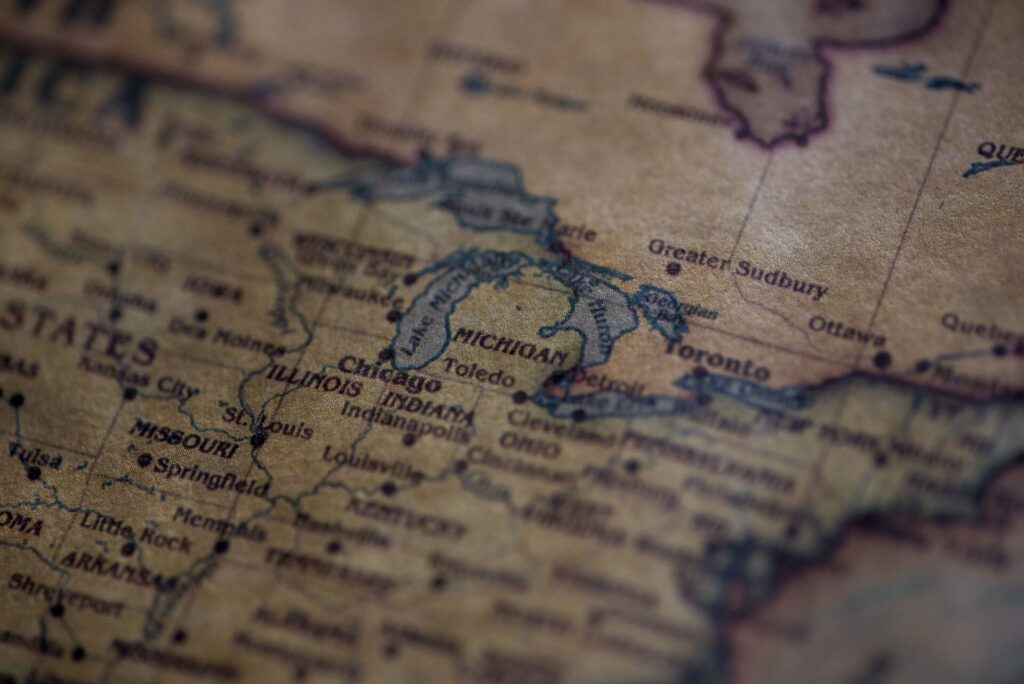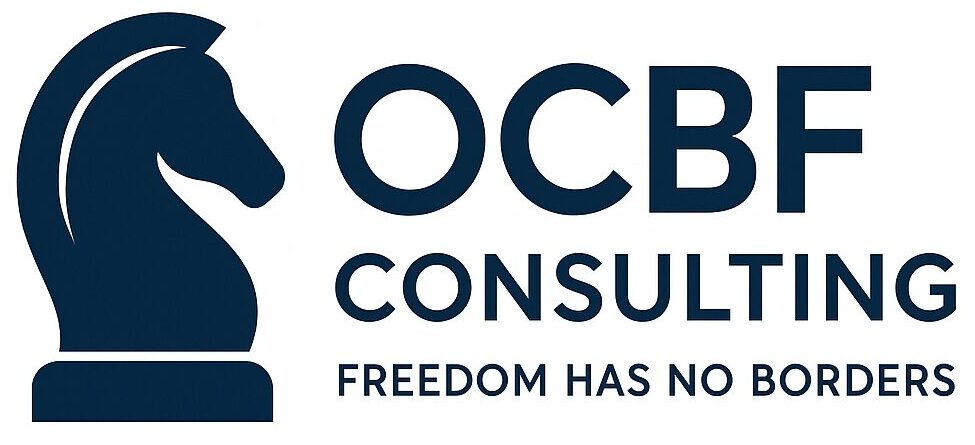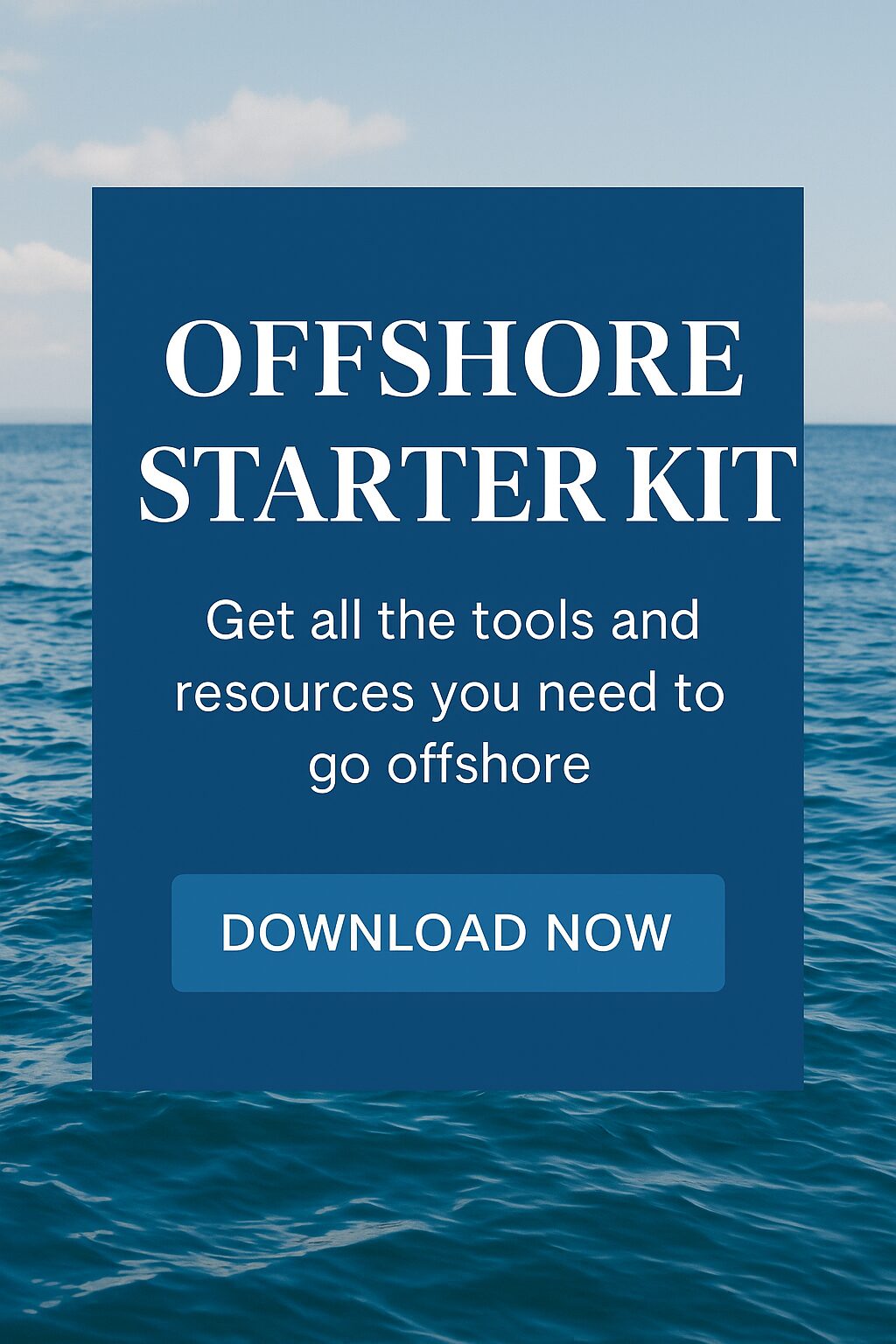The Ultimate Offshore Guide for 2025
Protect Your Wealth, Reduce Taxes, and Reclaim Control — Legally
Table of Contents
The financial world has changed. Privacy is evaporating. Governments are expanding surveillance powers under the guise of transparency. From aggressive tax collection initiatives to widespread data sharing under FATCA and CRS, your financial life is now more visible — and vulnerable — than ever. If you’re a U.S. entrepreneur, crypto investor, or digital nomad, the risks are real: frozen accounts, unexpected audits, frivolous lawsuits, and the ever-present threat of being doxed online. Subsequently, this offshore guide is going to be your entree into a hidden world.
For years, going offshore was seen as something only the ultra-wealthy did — something reserved for celebrities, oligarchs, or Fortune 500 companies. Not anymore. In 2025, smart offshore structuring has become accessible, affordable, and essential for anyone who values privacy, asset protection, and financial flexibility. You don’t need a Swiss bank account or a Cayman Island yacht. You just need a plan — and this guide is where that plan begins.
Whether you want to protect your digital assets, reduce your legal exposure, or create a global business structure that actually works, this guide will walk you through every step — legally and transparently. We’ll cut through the noise, debunk the myths, and give you actionable, step-by-step strategies to build your own offshore system the right way.
This isn’t about hiding from the government. It’s about taking control of your financial life — proactively, intelligently, and within the law.
Ready to start building your offshore plan? [Download your free cheat sheet here] or check out [The Offshore Starter Pack eBook] — the complete playbook for 2025 and beyond.
Let’s begin.

What Does "Offshore" Really Mean?
Forget the Myths. Here’s the Reality.
“Offshore” has become one of the most misunderstood terms in modern finance. Thanks to Hollywood tropes and tabloid headlines, it’s often associated with shady shell companies, tax evasion, and private islands loaded with secret vaults. But here’s the truth: going offshore is legal, strategic, and increasingly common among small business owners, crypto investors, and digital entrepreneurs.
Legally speaking, “offshore” simply refers to using entities, banks, trusts, or other financial structures in a jurisdiction outside your country of residence or citizenship. That’s it. There’s nothing inherently suspicious about having an international company or bank account — especially when you’re open about it with the relevant tax authorities (as U.S. law requires).
So why go offshore?
Because in an age of constant financial surveillance, unstable banks, overreaching governments, and endless regulation, operating purely within your home country often means sacrificing privacy, flexibility, and control. Offshore solutions allow you to opt out — legally — of high-tax, high-risk environments by using jurisdictional arbitrage.
Here's What Smart Offshore Structuring Offers
- Privacy: Keep your name off public company registries and minimize exposure to data leaks or doxing attacks.
- Tax Optimization: Legally reduce your corporate tax burden by earning income in zero- or low-tax jurisdictions.
- Asset Protection: Use international legal structures like trusts to shield your assets from lawsuits, creditors, and domestic legal risk.
- Jurisdictional Freedom: Choose financial systems that align with your values, not ones that work against them.
Going offshore isn’t about hiding — it’s about building a smarter system in a more favorable legal environment.
Want to go deeper? Check out our post: What Offshore Really Means in 2025
Up next: How to choose the best jurisdiction for your goals.
Is Going Offshore Right for You?
Use Cases for Digital Nomads, Entrepreneurs, Crypto Investors & More
Offshore structuring isn’t just for billionaires or multinational corporations anymore. In today’s economy, the offshore playbook is accessible —and incredibly useful — for everyday entrepreneurs, digital workers, and asset holders who want more privacy, protection, and control.
Here’s who offshore is especially right for in 2025:
Digital Business Owners
Running a Shopify store, SaaS app, or online consulting brand? An offshore company can streamline your operations, reduce tax drag, and open the door to global banking that isn’t tied to one jurisdiction.
Freelancers & Remote Consultants
If you work internationally — especially while traveling — an offshore structure can let you invoice clients professionally while optimizing for local tax residency and minimizing currency friction.
Crypto Holders
You might have privacy on-chain, but your exchange accounts, off-ramps, and bank deposits are fully visible. Offshore LLCs and trusts create legal separation between you and your wallets — adding protection and dox resistance.
U.S. Expats and Global Citizens
If you’ve moved abroad (or are planning to), an offshore structure combined with foreign residency or tax treaties can help you benefit from tools like the Foreign Earned Income Exclusion (FEIE) — while still staying IRS-compliant.
High-Risk Professions
Doctors, public figures, and anyone exposed to legal, reputational, or physical threats benefit from offshore privacy and firewalling — especially when holding crypto or high-value assets.
But it’s not for everyone. If you earn all your income from a local job, run a brick-and-mortar business, or want secrecy from tax authorities — this isn’t the path for you.
Want a full breakdown? Read: Who Should and Shouldn’t Go Offshore
Up next: How to choose the right offshore jurisdiction for your goals.

Choosing The Right Jurisdiction
Where to Set Up — And Why It Matters
Not all offshore jurisdictions are created equal. Picking the right one is more than just selecting a tropical locale — it’s about aligning your privacy needs, tax goals, banking access, and asset protection strategy with the country that best supports them.
Your jurisdiction is the foundation of your offshore plan. Get it right, and your structure runs smoothly, legally, and securely. Get it wrong, and you may face frozen accounts, tax headaches, or compliance nightmares.
Let’s explore five of the most powerful, proven offshore jurisdictions in 2025:
Nevis
- Setup Cost - $$
- Privacy - 5/5
- Bank Access: Moderate
Nevis is a fortress for asset protection and privacy. It offers LLCs that shield member information from public view and some of the strongest debtor protections worldwide. Ideal for U.S. crypto holders, consultants, and entrepreneurs needing legal distance from personal assets.
Belize
- Setup Cost - $
- Privacy - 4/5
- Banking Access - Limited
Belize IBCs are fast and inexpensive to form. They’re perfect for entry-level offshore setups, digital nomads, or solopreneurs who want a lightweight privacy shield without breaking the bank. While its banking sector is more limited, integration with multi-currency fintech tools is possible.
Cook Islands
- Setup Cost - $$$
- Privacy - 5/5
- Banking Access - Difficult
The gold standard for asset protection. Cook Islands Trusts are almost impenetrable by foreign courts and are designed to withstand U.S. legal attacks. Best for high-net-worth crypto investors and those seeking long-term wealth shielding.
UAE (RAK ICC)
- Setup Cost - $$
- Privacy - 4/5
- Banking Access - Excellent
UAE’s Ras Al Khaimah (RAK) International Corporate Centre is booming in 2025. It offers 0% corporate tax on foreign-sourced income, world-class banking access, and global legitimacy. Perfect for digital business owners, e-commerce operators, and consultants.
Panama
- Setup Cost - $$
- Privacy - 3.5/5
- Banking Access - Good
Panama combines solid territorial tax benefits with a mature banking system. It’s a popular pick for combining company formation with offshore bank accounts. The reputation is mixed due to the “Panama Papers,” but still remains viable and respected when done right.
Jurisdiction | Setup Cost | Privacy Score | Banking Access | Best For |
Nevis | $$ | 5 | Moderate | Crypto holders, consultants |
Belize | $ | 4 | Limited | Digital nomads, solo founders |
Cook Islands | $$$ | 5 | Challenging | High-net-worth asset protection |
UAE (RAK) | $$ | 4 | Excellent | E-commerce, remote consultants |
Panama | $$ | 3 ½ | Good | All-purpose company + banking structure |
Pro Tip: Match Your Jurisdiction to Your Mission
- Want rock-solid asset protection? Go with Cook Islands + Nevis.
- Need solid banking and operations? Start with UAE or Panama.
- On a tight budget? Belize is your entry point.
Up Next: Learn exactly how to set up your offshore company — step-by-step — and open a bank account without getting rejected.
How to Set Up an Offshore Company
Setting up an offshore company isn’t rocket science — but getting the sequence right is crucial. Many first-timers rush to incorporate, only to realize afterward they can’t get a bank account. At that point, their new company is just a glorified PDF collecting dust.
Enter Steve’s Rule: Bank first, company second.
That means you start with your banking options, make sure your chosen jurisdiction is accepted, and only then proceed with formation. Without banking, your company is a shell. With both, it becomes a powerful tool for privacy, asset protection, and global operations.
Why Sequencing Matters
Let’s say you form a Nevis LLC, only to find that your preferred offshore bank won’t touch Nevis entities owned by U.S. persons. Or you pick Belize for the low cost — but your crypto income flags their compliance team, and your account gets frozen.
Avoid this. Start with banking feasibility. Then structure everything around it.

Trending Posts
- Best Offshore Banks for Startups and Founders: What Actually Works in 2026

- Offshore Banking for Digital Agencies: What Actually Works in 2026

- Banking in Puerto Rico: What It Really Means in Reality

- Crypto Friendly Banks: What That Really Means in 2026

- Cook Islands Banks: What Offshore Clients Should Expect in 2026









